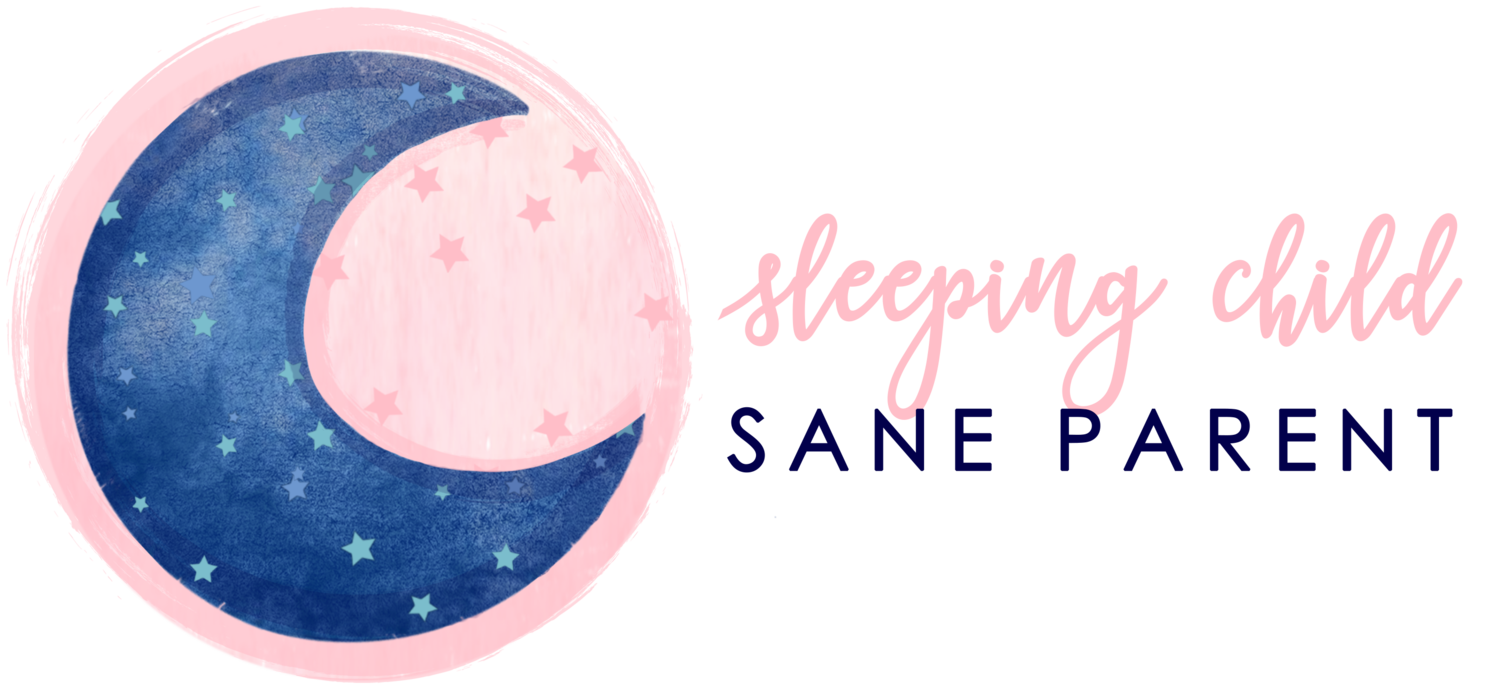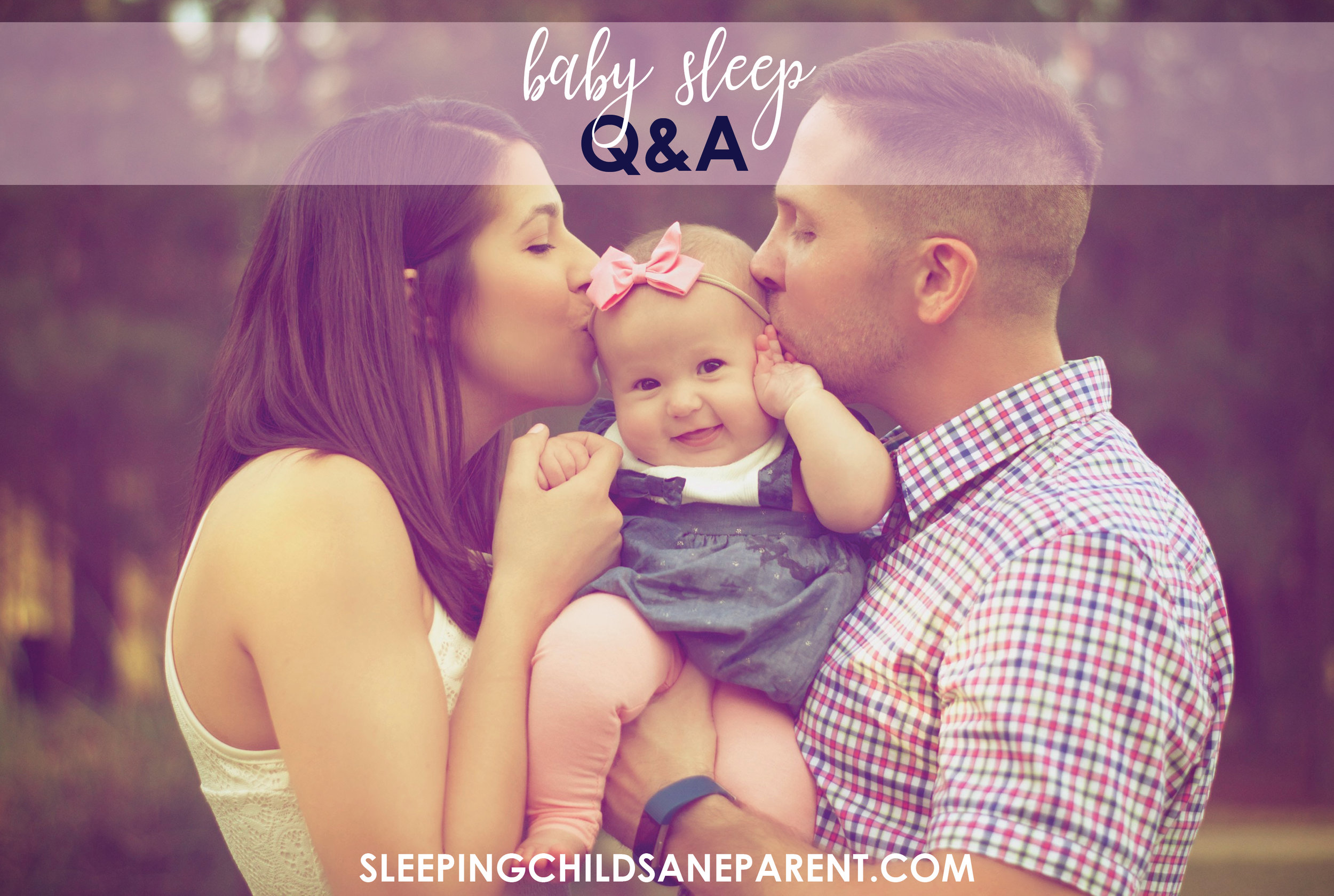In case you haven't heard, I do a live Q&A every Wednesday night on Facebook and Instagram. It's honestly one of my favorite parts of the week and of my job because I get to answer so many questions and help so many people at once. However, the time is always the same (7:30-8:00pm MDT), so if that time doesn't work for you, you may not have been able to ask me your sleep questions. And since I get so many questions coming in live now, I can't make it to as many pre-submitted questions as I used to be able to when I was just starting my lives. So I thought this week I'd just grab some of the questions from my ever-growing list and answer them here.
Dream Feeds
Q: How much should you feed during a dream feed? We have our 4.5-month-old on a schedule. Not ready to break any crutches or habits but getting used to this schedule. Bedtime is 7/7:30 and I've been dream feeding around 11. He typically eats 5-6 ounces at all his feedings, but at dream feed it's only like 2 ounces. Should I try to get him to eat more?
A: Dream feeds are a great way to get Baby's longest stretch of sleep to align with mom and dad's longest stretch of sleep. At a dream feed you typically feed however much Baby will take. If Baby is only taking 2 ounces, that's probably all he needs at the time, and I wouldn't try to force more; that will likely only result in spit up!
Since he takes so little at the dream feed, you may want to try dropping the dream feed and seeing if he can still get close to the next time he usually wakes (when he still has the dream feed). If dropping the dream feed doesn't have a huge effect on the next feeding time (so perhaps with the dream feed he usually wakes for another feed at 3:30am, and without the dream feed he wakes at 3:00am), go ahead and drop the dream feed. Although Baby is mostly asleep for the feed, it still interrupts his sleep a bit, so if you can skip it without much repercussion, that will be better for Baby!
Bouncing Baby to Sleep
Q: My 6-month-old won't nap unless I bounce her to sleep. She has gotten to the point where she is crying way more intensely when I put her down for a nap. I've been told I should let her cry it out, but it is soooo hard. What do I do? How do I get her to nap and be able to put herself to sleep?
A: If Baby requires bouncing (or nursing, or rocking, or walking) to fall asleep, that means Baby has a sleep association. It basically means that Baby doesn't have the skill to fall asleep independently. If you want Baby to learn to fall asleep independently, you have to give her the opportunity to practice doing so. She can never learn to fall asleep on her own if she never gets to practice, just like I can never learn to play the drums if I never sit down at a drum set. If you don't address this issue early on, it will still be an issue 2, 3, even 4 years from now (although the exact scenario will morph a bit as Baby gets older). Check out this blog post on teaching your child to fall asleep independently.
As for the difficulty of cry it out (CIO), I hear you. Nobody likes to hear their baby cry! Unfortunately, there will likely be some crying because you're totally changing things up for Baby. She used to get bounced, and now she doesn't get that! Babies fight change just as hard as adults do, but since they don't have words, they can only cry to communicate their discomfort and confusion. Just remember to give your baby all your love and affection when she's outside of the crib, but show her you believe in her ability to learn hard things by allowing her to practice in her crib. All that being said, only do what you're comfortable with; straight CIO is not the only sleep training option.
Nightwakings due to Teething
Q: How do I get my teething baby to sleep better? He is 10 months old and getting his first top tooth. He has woken up in the middle of the night the last three days and won't go back to sleep for an hour or two.
A: This is a very common question, and I want to let you in on a little secret: teething doesn't have to negatively impact sleep.
Many things can bother Baby in the night -- sickness, growth spurt pains, and yes, teething. But these things are typically not the cause of the nightwakings. You see, we all wake between sleep cycles throughout the night. The wakings are so brief that we hardly notice them, but if Baby has a sleep association, he will fully awaken instead of just briefly awaken. Any ailments are going to accentuate Baby's inability to self-soothe.
So my advice is to start sleep training. Then, when Baby wakes between sleep cycles -- even when he's teething or sick -- he'll be able to simply turn over and go back to sleep. You might find that you never even know your baby is teething until you see the tooth pop through!
Prolonged Nightwakings
Q: My 9-, almost 10-month-old wakes up multiple times a night wanting to nurse, but will fall asleep after like 5-10 minutes, so I know she's not really hungry. I do nurse her right before her naps and bedtime, but she is awake when I put her in her crib and she sleeps great for her naps. For the past week when she wakes up at night, I've just been rocking her and not letting her nurse, and she'll fight sleep for HOURS (last night it took 4 hours to get her back to sleep). And the second I let her nurse, she falls asleep within minutes. What can I do? Could she be sleeping too much during the day? Her first nap is usually 2 hours and the second is 1.5. I put her down for bed between 7:30 and 8pm. I mentioned it at her 9-month check-up, and her pediatrician said she is perfectly capable of sleeping through the night since she is in the higher percentile for both weight and height for her age.
A: Okay, lots to unpack in this question!
First: As long as you and your pediatrician are both okay with it, I always night wean babies that are 9+ months old. Many babies can drop all night feeds prior to this time, but unless there's a specific issue, babies can definitely drop them by this age. This post on sleeping through the night has more information if you're interested.
Second: Sometimes babies try to tell us that they would rather do the work on their own, and they don't need mom or dad interfering with them. If you are rocking Baby for 4 hours to get her back to sleep, I would definitely suggest trying to let her fall asleep on her own. She knows how; you said that she does it for naps and before bed. I would bet that if you had allowed her to fall back asleep on her own, it would have taken less time. (Which is not to say that it wouldn't still take some time! Just less of it.)
Third: It is possible for babies to sleep too much during the day, and for that to interfere with night sleep. However, in this case, it sounds like she's getting a great amount of sleep during the day. The issue is actually that she's going to bed too late. Too late of a bedtime can lead to extra nightwakings, as well as early morning (before 6am) wakeups. At 9-10 months, Baby should be going to bed 3-3.5 hours after waking up from nap 2, so probably around 6/6:30pm. Check out this post for more information on how I recommend doing bedtime.
Dropping Nightfeeds
Q: Are there any telltale signs that a baby is ready to drop their night feeds? My baby is 4 months and wakes for two feeds in the night, but isn't hungry when he wakes in the morning. I also find he doesn't take full feeds during the day and hence may contribute to nightwakings. 1) How do I get baby to take full feeds during the day? 2) If he takes full feeds would he wake less in the night or could I night wean if he is taking full feeds in the day? Also note my baby does soothe himself to sleep for naps and nighttime.
A: I have a blog post all about how to teach baby to sleep through the night, so for full details, you might want to check that out. But to address your specific questions:
1) You can encourage Baby to take full feeds during the day by making sure to feed first thing after wakeups. Younger babies have the most energy right after waking up, so we want to capitalize on that energy.
2) Full feeds in the day will definitely help night sleep come together, but keep in mind that 2 nightfeeds are biologically appropriate for babies 4-6 months old.
If Baby eats well for a later nightfeed (4-5am) but not for the first feed of the day (6-7am), you may want to try weaning that second nightfeed a bit (or completely!) so that Baby eats better for his first feed of the day.
If you have more questions for me, try to make it to my live Q&A's! But if you can't make it, know that I'm finding more ways to get to all your questions :)


